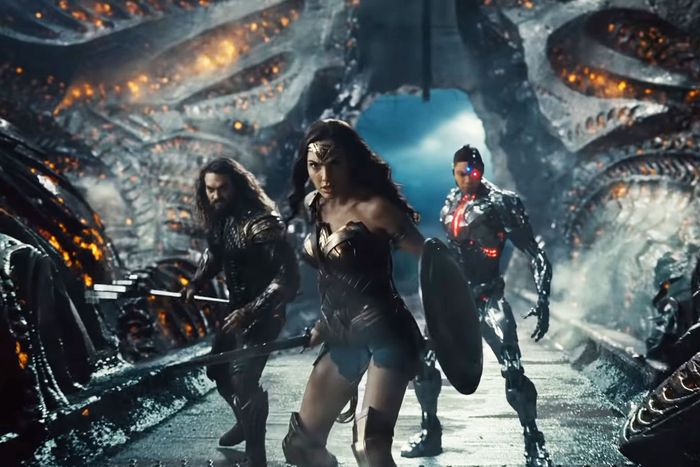
This month, against all odds, legions of fans were able to successfully push to get the once-mythic Snyder Cut released. Zack Snyder’s Justice League — a four-hour behemoth of a film that represents the director’s true vision for the superhero epic and vindication for his supporters — premiered on HBO Max two weeks ago. But having seemingly done the impossible and getting the Snyder Cut released, could these same fans propel the Snyder Cut to Oscar glory? Could we see Zack Snyder’s Justice League at next year’s Academy Awards?
Short answer: No. Long answer: Almost certainly not.
To be clear, Warner Bros. hasn’t made any indication that it’s about to gear up for a massive “For Your Consideration” campaign for Zack Snyder’s Justice League for the 2022 Oscars. (Warner Bros. did not respond to comment on the film’s Oscar eligibility.) However, it’s pretty clear that if the studio did want to throw the Snyder Cut’s hat in the ring for next year’s awards, it would have to really, really fight for it. As it currently stands, Zack Snyder’s Justice League is ineligible for awards consideration, full stop.
The specific rules for next year’s 94th Oscars have not been created yet nor has the submission site been reopened, but the Academy’s Awards and Credits Department told Vulture that Zack Snyder’s Justice League is almost certainly ineligible. A big part of the reason why is because Zack Snyder’s Justice League was already eligible for the Oscars back in 2018, for the 90th Academy Awards, when it was just Justice League. (It was ultimately not nominated for anything.) The Snyder Cut is, as the name implies, a director’s cut. It’s twice the length and has 100 percent more “new” footage, but as far as the Academy is concerned, it already came out.
“In regard to director cuts, a movie is unlikely to qualify again, as no more than 10 percent of footage can be shown prior to its theatrical release,” the Awards and Credits Department says, adding that it does not matter that there’s a whole movie’s worth of never-before-seen footage. “No matter the length, if a large portion of the movie was previously distributed (more than 10 percent), it would not be able to enter, regardless of the new material. If the submitter felt otherwise, we would need to investigate the situation and the request.”
But wait!, you might be thinking. What about the specific parts of the Snyder Cut that are totally new? Still doesn’t work that way. Zack Snyder’s Justice League has an entirely different score than the theatrical release (from Junkie XL rather than Danny Elfman), and there are actors who weren’t in the original version, like Willem Dafoe and Jared Leto. However, Zack Snyder’s Justice League couldn’t only be eligible for Best Original Score or Best Supporting Actor. The way eligibility works for the Oscars, an entire movie needs to be submitted.
“The craft categories are not entered individually,” the Awards and Credits Department explains. “Feature films (outside of Documentary and International Feature) enter by filling out a General Entry form. The General Entry form enters a movie to compete in Best Picture, which automatically makes it eligible for consideration in the craft categories (Directing, Acting, Editing, Costume, etc.).”
Ultimately, none of this matters, though, since Zack Snyder’s Justice League never played in theaters. Instead, it’s an HBO Max exclusive that premiered on the new streaming service on March 18 in the U.S. It was available on some other platforms internationally (in places where HBO Max isn’t available), but at no point was it a theatrical release in the U.S., and that’s what counts.
Due to the coronavirus pandemic and the mass closing of theaters around the country, the 93rd Oscars made an exception to its normal rules, allowing films to be eligible if they premiered on streaming services, first provided they had an intended theatrical release. (In past years, streaming services like Netflix have had to debut their films in limited runs in the Los Angeles area in order to qualify for awards, before adding them to the streaming library.) It’s unclear if the 94th Oscars will feature a similar exception, but it doesn’t appear to matter, since Zack Snyder’s Justice League was always going to be an HBO Max Original first and foremost.
“The key thing for eligibility is that a movie must show that it had a theatrical release in a qualifying city or had an intended theatrical release (in the case for theater closures) prior to releasing online,” the Awards and Credits Department says. “If there is no evidence of that, then anything else is a moot point.”
Snyder, for what it’s worth, has said that he looks forward to showing the movie in Imax theaters once they can safely reopen (one would hope, given that the movie is in an Imax-friendly four-to-three ratio). Those future plans have no bearing on Oscar eligibility, however.
So there you have it. While the Awards and Credits Department admits that “this is all hypothetical, and each entry is unique in circumstances,” barring an extremely unlikely and dubiously successful push on Warner Bros.’ behalf, Zack Snyder’s Justice League won’t be making an appearance at next year’s awards. Perhaps that’s a small blessing for the #ReleaseTheSnyderCut crowd. Zack Snyder’s Justice League can’t lose Best Picture if it’s never nominated due to (numerous) technicalities.

